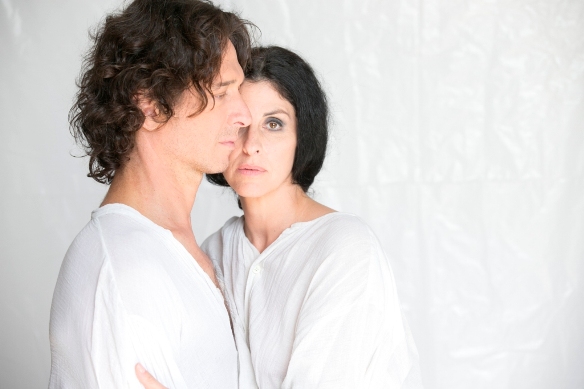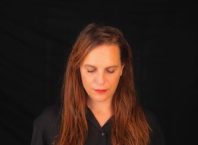
Gesher Theatre has invited a dybbuk into their midst: The Dybbuk will be the theatre’s opening play of 2014 in January. There is a symbolic relevance to the production of this play at Gesher, about a century after it was first penned by S. Ansky (1863 – 1920).
The tale of a young woman possessed on the eve of her wedding by the soul of her dead beloved was based on S. Ansky’s ethnographic research in Jewish communities, documenting Jewish folklore. Although Ansky did not live to see his play produced, yet poet Haim Nachman Bialik’s Hebrew translation (based on the Russian and Yiddish texts) was taken up by a small troupe of actors who staged the play in Moscow under the direction of Yevgeny Vakhatangov. This production heralded the start of Habima National Theatre.
Now the dybbuk shall be taken up by another Yevgeny: Gesher Theatre artistic director Yevgeny Arye, who came to Israel from Moscow with his theatre troupe in 1991. There is an affinity between Habima of those days, with its origins in the Russian language and theatre culture and its connection to Hebrew and Israel, and Gesher Theatre, an affinity that has been commented on by theatre critic Michael Handelzalts. Founding Gesher (the word means bridge in Hebrew) Theatre, Arye has merged his distinctive artistic voice and vision with the Israeli theatrical landscape, creating an oasis of international theatre in Tel Aviv – Jaffa. Although the Habima production starring Hanna Rovina has attained the status of legend in the chronicles of Israeli theatre, The Dybbuk has been produced in many different forms over the years, on stage, screen, in dance and in versions employing puppets.
The Gesher Theatre production of The Dybbuk will be neither a revival nor adaptation. A new play, The Dybbuk, written by Roy Chen, Gesher Theatre dramaturg, inspired by S. Ansky’s play, will be directed by Yevgeny Arye. In a press meeting that took place in Gesher’s home – Noga Theatre in Jaffa, Yevgeny Arye commented on Gesher’s new adventure: “I don’t need to tell you that this is a legendary play, the place where Hebrew theatre began…it’s a play that has become a myth. We understand that we’ve entered a minefield. Even people who haven’t seen the play know that it was amazing. In presenting the story to contemporary audiences one must find a new approach.”
This approach involved consulting psychologists and researching the phenomenon of possession from a psychological perspective. “It has different names in different cultures,” said Yevgeny Arye, “some cultures view the voice as Satan, in ancient Hebrew culture it is called a dybbuk: an external evil presence that enters a person. We are telling a story with a psychological foundation – a disease that originates in love. In Ansky’s play, Hanan (the suitor rejected by Leah’s father) appears very briefly, we do not know very much about him. In our play he’s onstage almost all the time, close to the heroine.”
Another intriguing aspect of this new approach may be seen in the casting. The roles of the two would-be lovers, Leah and Hanan, will be performed by Efrat Ben-Zur and Israel (Sasha) Demidov. Doron Tavory joins the cast as Leah’s father, marking his first performance with Gesher Theatre. Yevgeny Arye commented on the casting: “Notice, these two actors are not 18 year olds. This is connected to our understanding of the play. It is a love story of two people who have already lost much in their lives. Their chance to realize their love… that is the problem: it is a love that takes place between two worlds.”
The Dybbuk will premiere at Gesher Theatre on January 13, 2013.
Links: Gesher Theatre website ; Gesher Theatre facebook page





